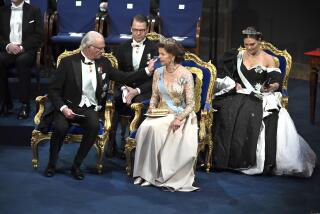MUSIC REVIEW : Orphei Drangar From Sweden in Local Debut
- Share via
The 350th anniversary of New Sweden probably does not loom large on many calendars outside Delaware, where Sweden established a settlement in 1638. Congress and the L.A. County Board of Supervisors have noted the occasion, though, in official resolutions, and a variety of events celebrating Swedish culture and technology have blossomed across the country.
As one result, Orphei Drangar, an 80-voice male choir, made its local debut Tuesday evening at Royce Hall. Those who missed it can only hope a return visit will not be dependent on New Sweden’s 400th anniversary.
The Serfs of Orpheus, as the program book translates the choir’s name, till a fertile field with vigor and skill. The repertory is broad and the performance was remarkable for both strength and finesse.
The inevitable set of Swedish folk songs was delivered with zest and careful attention to color and text. Hugo Alfven, who directed Orphei Drangar for more than 30 years, was represented by arrangements and his own lush, evocative “Dawn by the Sea.”
Eric Ericson, the current director, has instilled a stylistic and linguistic facility that was quite apparent in a group of pieces by Saint-Saens, Richard Strauss and Schubert. Most enticing, though, were the more modern efforts: the sound explorations and comic visual counterpoint of Folke Rabe’s “Rondes”; Britten’s taut, tense programmatic “Ballad of Little Musgrave and Lady Barnard,” and Barber’s beautifully cold “A Stopwatch and an Ordnance Map.”
The long program ended with an onslaught of pops and novelty numbers, including a timid, stilted “Yesterday,” attributed to one P. McCarthy (sic). A rich, measured “Deep River” was much the best of the hokey lot.
Two members of the local host committee took the opportunity for star turns. Actress Maud Adams’ narration of Signe Hasso’s English adaptation of a Swedish folk song, backed by the chorus, made a gentle interlude. Johnny Mann’s self-indulgent, show-bizzy tribute to the late Norman Luboff proved dull and distracting.
Orphei Drangar produced its own soloist in Magnus Fagerberg, who brought a smooth, focused baritone to two numbers. Gunnar Birgegard from the chorus introduced each one genially, and pianists Folke Alin and Robert Sund provided neat accompaniments when required.
More to Read
The biggest entertainment stories
Get our big stories about Hollywood, film, television, music, arts, culture and more right in your inbox as soon as they publish.
You may occasionally receive promotional content from the Los Angeles Times.









